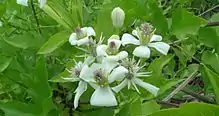| Clematis ligusticifolia | |
|---|---|
 | |
| Scientific classification | |
| Kingdom: | Plantae |
| Clade: | Tracheophytes |
| Clade: | Angiosperms |
| Clade: | Eudicots |
| Order: | Ranunculales |
| Family: | Ranunculaceae |
| Genus: | Clematis |
| Species: | C. ligusticifolia |
| Binomial name | |
| Clematis ligusticifolia | |
Clematis ligusticifolia is a climbing, spreading vine with showy flowers. It is also known as old-man's beard, yerba de chiva, and virgin's bower, (though old-man's beard may also refer to C. vitalba, and virgin's bower may also refer to C. lasiantha). It is native to North America where it is widespread across the western United States in streamside thickets, wooded hillsides, and coniferous forests up to 8,500 feet (2,600 m).[2]
It was called "pepper vine" by early travelers and pioneers of the American Old West. They used it as a pepper substitute to spice up food since real black pepper (Piper nigrum) was a costly and rarely obtainable spice. Like the rest of the genus Clematis, it contains essential oils and compounds which are extremely irritating to the skin and mucous membranes. Unlike Black Pepper or Capsicum, however, the compounds in clematis cause internal bleeding of the digestive tract if ingested internally in large amounts.[3] The plants can be toxic if consumed in large enough amounts, and can be toxic to small animals.[4] Native Americans used very small amounts of clematis for migraine headaches and nervous disorders.[5] It was also used as an effective treatment of skin infections.[6] A whole-plant hot water extraction was used to treat eczema, and a leaf compress is used to treat chest pain, sores, and boils.
It is dioecious, with male and female flowers on separate plants.[7]
References
- ↑ "NatureServe Explorer 2.0". explorer.natureserve.org. Retrieved 2023-10-23.
- ↑ "Clematis ligusticifolia in Flora of North America @ efloras.org". www.efloras.org.
- ↑ Nickel, Earl (2018-09-07). "Clematis vine an adaptable native with a whimsical side". SFChronicle.com. Archived from the original on 2018-09-08. Retrieved 2021-01-04.
- ↑ "Clematis". ASPCA. Retrieved 2021-01-04.
- ↑ Moore, Michael (2003). Medicinal Plants of the Mountain West Revised and Expanded Edition. Santa Fe: Museum of New Mexico Press. ISBN 978-0890134542.
- ↑ Tilford, Gregory L. (1997). Edible and Medicinal Plants of the West. ISBN 0-87842-359-1.
- ↑ Borkent, Christopher J.; Harder, Lawrence D. (2012). "Flies (Diptera) as pollinators of two dioecious plants: behaviour and implications for plant mating". The Canadian Entomologist. 139 (2): 235–246. doi:10.4039/n05-087. ISSN 0008-347X. S2CID 86638219.
Further reading
- Hill, Clyde; Hill, Steven; Lamb, Connie; Barrett, Thomas W. (1974). "Sensitivity of Native Desert Vegetation To SO
2 and to SO
2 and NO
2 Combined". Journal of the Air Pollution Control Association. 24 (2): 153–157. doi:10.1080/00022470.1974.10469907. ISSN 0002-2470. - Shoemaker, R. A.; Müller, Emil (1963). "Generic Correlations and Concepts: Broomella and Pestalotia". Canadian Journal of Botany. 41 (8): 1235–1243. doi:10.1139/b63-103. ISSN 0008-4026.
- Turner, Nancy J (1984). "Counter-irritant and other medicinal uses of plants in Ranunculaceae by native peoples in British Columbia and neighbouring areas". Journal of Ethnopharmacology. 11 (2): 181–201. doi:10.1016/0378-8741(84)90038-2. ISSN 0378-8741. PMID 6387285.
- Fierke, Melissa K.; Kauffman, J. Boone (2006). "Invasive Species Influence Riparian Plant Diversity Along a Successional Gradient, Willamette River, Oregon". Natural Areas Journal. 26 (4): 376–382. doi:10.3375/0885-8608(2006)26[376:ISIRPD]2.0.CO;2. ISSN 0885-8608.
